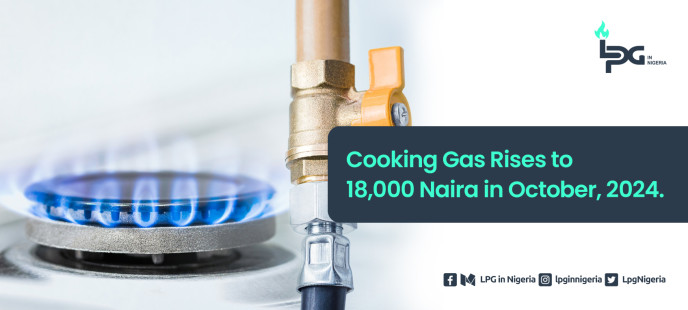- 3602
- 0
Sharing Ideas and Updates on LPG in Nigeria and related information to enable effective collaboration within the LPG Value Chain
Cooking Gas Rises To 18,000 Naira In October, 2024.

In October 2024, retail prices of Liquefied Petroleum Gas (LPG) across various Nigerian cities displayed significant variation, reflecting the unique supply-demand dynamics and logistical factors affecting each region. This report, based on data gathered from social media platforms—Twitter (X) and Facebook—provides insights into LPG price trends across the country.
Price Analysis
Highest Prices: The highest prices per 12.5 kg cylinder were recorded in Port Harcourt, Ojo (Lagos State), CMS Lagos, and Edo, where consumers paid ₦18,750. This translates to a cost of ₦1,500 per kg. The elevated prices in these regions may be attributed to higher transportation and distribution costs, along with local demand dynamics.
Lowest Prices: Ijebu Ode had the lowest price, with consumers paying ₦14,375 for a 12.5 kg cylinder, or ₦1,150 per kg. CMD Road in Lagos also offered relatively affordable pricing at ₦15,500 (₦1,240 per kg). These lower rates could be due to better accessibility or competitive pricing from suppliers in these areas.
Average Price: Across all cities, the average price of a 12.5 kg cylinder of LPG was approximately ₦17,226. This places the average cost per kg at about ₦1,378, highlighting a moderate price range for most Nigerian consumers.
Regional Breakdown
Lagos State: Prices in Lagos varied significantly, with CMD Road offering one of the lowest rates at ₦15,500 per 12.5 kg, while areas like Ojo and CMS had higher prices of ₦18,750. This price spread underscores the diversity in economic and logistical conditions across Lagos.
Other States: Cities like Enugu, Kogi, Port Harcourt, and Nassarawa showed moderate prices, with 12.5 kg cylinders generally priced between ₦16,250 and ₦17,500. These mid-range prices suggest relatively stable LPG distribution chains in these regions.
Observations
The fluctuation in LPG prices highlights the impact of regional distribution costs, infrastructure quality, and possibly the level of market competition. Lower prices in locations such as Ijebu Ode and CMD Road (Lagos) provide more affordable options, benefiting consumers who rely on LPG for essential needs. Addressing these price disparities by improving supply chains and accessibility could make affordable LPG more widely available across Nigeria.
In conclusion, while LPG prices remain high in some regions, these insights from social media platforms like Twitter (X) and Facebook reveal that more affordable alternatives exist in certain areas, offering potential savings for Nigerian households dependent on LPG.
















0 Comment.